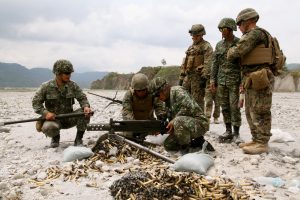Thousands of U.S. and Filipino forces yesterday kicked off one of the largest military exercises in years, marking a positive turn in the U.S.-Philippines alliance in the twilight of President Rodrigo Duterte’s disruptive six-year term in office.
The Balikatan exercises will run until April 8 and, according to the Associated Press, will involve nearly 9,000 navy, marines, air force, and army personnel, including 5,100 U.S. soldiers. The exercises will include live-fire maneuvers, aircraft assaults, urban warfare, and beach landings. The AP cited U.S. and Philippine military officials as saying that the exercises were intended to bolster the two nations’ longstanding treaty alliance and bolster their “capabilities and readiness for real-world challenges.”
Balikatan, a Tagalog word meaning “shoulder to shoulder,” has been held annually since 1991, the year that the U.S. committed to closing its two giant military bases at Subic Bay and Clark. But the exercise was canceled in 2020 and held in scaled-down form last year due to the COVID-19 pandemic.
This year’s revived exercise, which the two sides are billing as the largest ever, also comes at a time of increasing geopolitical uncertainty, amid the Russia-Ukraine war and China’s continuing assertiveness in disputed parts of the South China Sea, including in areas claimed by the Philippines. Notably, it will conclude just a month shy of the Philippines’ pivotal presidential election, in which 10 candidates are vying to succeed Duterte as president.
The Balikatan exercises are one of the most visible manifestations of the 1951 Mutual Defense Treaty, which commits the U.S. and the Philippines to come to the aid of the other in case of an attack on either country. But the alliance has taken an adverse turn since President Duterte entered office in mid-2016. Out of a combination of perceived political pragmatism and personal slights, Duterte has steered his country away from its close security relationship with the U.S. and established warmer relations with China. In particular, he laid aside the ruling of an international tribunal that ruled most of China’s claims in the South China Sea invalid under international law in favor of bilateral engagement and infusions of Chinese infrastructure funding.
In February 2020, Duterte even went so far as to announce the cancelation of the Visiting Forces Agreement (VFA), an important supplementary pact that lays out rules for the deployment of U.S. troops in the Philippines, after one of his close allies was refused a U.S. visa for human rights violations. But the strong pro-U.S. orientation of much of the Philippines’ security and political establishment has acted as a stabilizing force during the twin disruptions of the Duterte and Donald Trump administrations.
In the end, the Philippine leader held off on abrogating the VFA for good, announcing three successive six-month stays of the cancelation. Then, last August, Philippine Defense Secretary Delfin Lorenzana announced that Duterte had canceled the termination of the agreement after his meeting with visiting U.S. Defense Secretary Lloyd Austin.
Even though the VFA, and the alliance as a whole, have survived Duterte’s personal resentments and impetuous leadership style, there will be many in Washington who will be breathing a sigh of relief as Duterte’s impending exit from Malacañang. With Duterte’s exit, the latent pro-U.S. orientation of the Philippine establishment will likely reassert itself.
Just one question remains: while most presidential candidates have committed themselves to a close relationship with the U.S., things are less certain with Ferdinand Marcos Jr., the current presidential frontrunner and Duterte ally. In January, Marcos suggested that he would continue to set aside the 2016 arbitral award in pursuit of a bilateral deal with Beijing over the South China Sea. It is unclear how much this was a reflection of how Marcos would actually govern as president, nor whether it would also be accompanied by Duterte-esque anti-American flourishes. Whatever the answer, as the Balikatan exercises demonstrate, the impending changeover of administrations offers the ideal time for a reset in Philippine-U.S. relations.

































